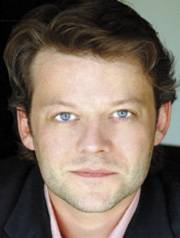Wednesday, April 2, 2008 | 2 a.m.

Jeremy Kushnier
In today's Sun
Sun Archives
- Peaks and Valli (4-5-2002)
Beyond the Sun
For the past year Jeremy Kushnier has been playing the role of Tommy DeVito in the musical “Jersey Boys.”
He portrayed the Four Seasons founder in the San Francisco company and in Chicago before joining the Las Vegas cast.
“This show can be very Vegas-specific,” Kushnier says. “So I thought it would be kind of exciting to play here, especially my character.”
The 32-year-old actor left Chicago about four weeks ago, spent a week in Florida and then began rehearsing in Las Vegas.
“There’s literally a line in the show when Tommy’s debts sort of start adding up and one of the mob guys says, ‘You’re moving to Vegas,’ and the last time they said it to me in the Chicago production it had a little bit different meaning to it.”
Kushnier, who has a career as a musician on the side, has performed in “Footloose” and “Rent” on Broadway and has toured with “Rent,” “Aida” and “The Who’s Tommy.”
He talked to the Sun about “Jersey Boys” and about playing DeVito, who has lived in Las Vegas since 1970.
Q Have you ever met or talked with Tommy DeVito?
No. I think I may be the only Tommy that has yet to meet or talk to him.
What I have to do is put a call in to him. To be honest, I’d love to go play 18 holes with him and pick his brains about what he feels about the show and what he feels how he’s represented. He’s a real guy, not just someone somebody made up. I’m representing myself and I’m representing the show, but I’m also representing this guy. I feel like I do him justice. I feel like I’m not trying to do a caricature of a Jersey guy who’s maybe got ties to the wrong people. I’m playing a guy that’s sympathetic, a guy that — whether or not he made all the right choices — had all the right motivation behind it.
Did you do any special preparation for the role?
Characterwise, I’d been living in New York for 10 years and I had a lot of buddies out in Jersey. Other than that, he’s this charismatic character that really did get the group going. Maybe he was a little misunderstood at times. The words that Rick Elice and Marshall Brickman wrote sort of make it pretty easy to get into this character every night. All of these guys, they’re pretty colorful.
Did you feel a need to try to capture his character the way a tribute artist might — with all the mannerisms?
It’s a little daunting playing somebody who’s still alive. I wanted to approach the role as a character more than anything. I wanted to be fair to his story, but it doesn’t matter who you’re playing in any show, your own life has to be part of it because that’s all you have to draw from. But I’m a musician, too. I have a recording career on the side I’ve been plugging away at. So I understood him from that side. I was lucky enough early in my career to be relatively successful in theater, so you sort of understand that. I was thrust into a smaller version of the public eye, but unless you were them you have no idea how they felt. Nick Massi, at the end of the show, has a great line: “You sell a hundred million records and see how you handle it.” I think that’s totally true. These are just four regular guys who happened to be musicians from Jersey who got thrust into the public and fame and stardom. I don’t think anyone can be prepared for that. Unless you were them it’s hard to grasp that. But during the show, every night, you get a real sense of it — getting to sing “Sherry” and “Walk Like a Man” and “Big Girls Don’t Cry” — the reaction from the audience gives you a taste of what they must have felt in front of those huge crowds, and singing on “Ed Sullivan.”
After playing the role of Tommy for a year, what are your feelings about him?
Starting the group, he was single-minded in what he wanted to accomplish. He wanted to be successful. He wanted to be a rock star, and not a lot of things were going to get in his way. From my character’s point of view I guess he feels a little bit “dissed” by the fact that Gaudio came in and Frankie and him became really good friends and they had a real connection. Just from the character’s standpoint I think he feels he doesn’t get a lot of credit for the fact that he was the first guy to say, “Hey Frankie, come on up, get up onstage and sing with us,” and that he really did keep this group together through everything, and they went through a lot of stuff.

Join the Discussion:
Check this out for a full explanation of our conversion to the LiveFyre commenting system and instructions on how to sign up for an account.
Full comments policy